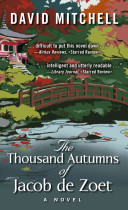Jacob de Zoet was a young Dutchman, a clerk, who fell in love with a beautiful young woman. They planned to marry, but her wealthy father had an objection. He believed that Jacob needed to prove himself worthy and to demonstrate that he could provide for his lovely daughter. He helped Jacob secure a job with the Dutch East India Trading Company. In their employ, he was to spend five years making his fortune and proving himself to his future father-in-law. Almost immediately Jacob set sail for Nagasaki, Japan. The year was 1799 in Japan’s Edo era, the age of the Shoguns.
Because he was an honest man, Jacob immediately fell afoul of the corrupt businessmen who oversaw the trading. He was consigned to a lowly job well below his skill level. Sometime his work was tedious and unrewarding, but he always worked with the same diligence, no matter the task. He did make some good friends, including the company doctor and a mysterious young woman who was a midwife. This woman had a facial disfigurement that had isolated her from most other people, and she was a woman of great intelligence and sense of self. With his work, his new relationships, and his hope for the future with his fiancé, he embarked on what proved to be an adventurous life like nothing he could ever have dreamed.
The story is superbly written by an author who has become one of my favorites. David Mitchell. Mitchell is an extraordinary storyteller. He can speak in such varied voices, and here he tells a tale of love, religious devotion (and fanaticism), political intrigue, kidnapping, murder. Jacob never disappoints. He is a complex character who is honest, generous, loyal and kind. He is a man of integrity, and this alone strikes me as unusual for a 21st century novel. He has his flaws, but he is consistently likeable.
The setting, Japan in 1799, provides a rich historical and cultural background. Non-Japanese were not allowed into the city of Nagasaki except by special permission and then they were escorted by guards and instructed in what they could and couldn’t do and say. Most of the action takes place on the small man-made island of Dejima where the Westerners lived and worked. Dejima was connected to the mainland by a guarded bridge. A wall also separated the island from the city. Part of the story takes the reader away from Dejima to an isolated monastery in the interior of Japan; to the halls of power in Nagasaki; and aboard an English frigate. There is a lot of action and lots of surprises.
After you have read and enjoyed this book, treat yourself to other David Mitchell books: the remarkable Cloud Atlas and an unusual but fascinating coming-of-age story, Number9Dream.
 “It’s as difficult to put this novel down as it is to overestimate Mitchell’s virtually unparalleled mastery of dramatic construction, illuminating characterizations and insight into historical conflict and change. Comparisons to Tolstoy are inevitable, and right on the money.”
“It’s as difficult to put this novel down as it is to overestimate Mitchell’s virtually unparalleled mastery of dramatic construction, illuminating characterizations and insight into historical conflict and change. Comparisons to Tolstoy are inevitable, and right on the money.”
— Kirkus Reviews, starred review





